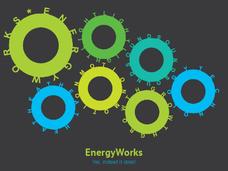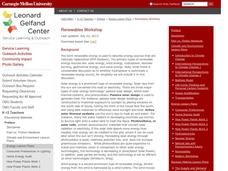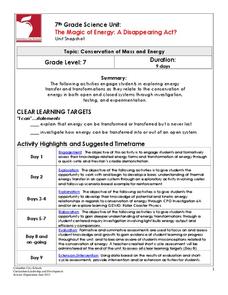NOAA
Energy from the Oceans
Can Earth's oceans produce a steady supply of clean energy? Scholars explore the uses of tidal and thermal energy in the 11th installment of a 13-part series about ocean-based alternative energy sources. Learners examine the current...
Government of South Australia
Don't Waste Your Energy
Don't lift another finger, this physical and environmental science unit has everything you need to begin teaching your class about energy. Starting with a look at the greenhouse effect, these lessons and activities take young scientists...
Teach Engineering
Exploring Energy: Kinetic and Potential
The potential of the energy in the class is moving. The third segment in a six-part unit on energy provides a deeper understanding of kinetic and potential energy. Learners understand the relationship between mass, speed, and energy and...
Teach Engineering
Energy Efficiency
Using the resource is probably the most efficient way to learn about efficiency. The 18th installment of a 25-part Energy Systems and Solutions unit has pupils investigate energy efficiency through discussions and associated activities....
Bonneville
Let's Build Our Wind and Solar Energy Toy
Who says toys can't be educational? The fourth of five parts in the Solar Updraft Towers unit has scholars create toys that run on solar and wind energy. The devices need to be solar updraft towers that can be placed on a warm surface...
National Energy Education Development Project
Energy Works: Yes, Indeed it Does!
Moving from its definition to how it moves and its different types, scholars see different examples and then move into its application and use in everyday lives, in an energy-based presentation.
Teach Engineering
Energy Forms and States Demonstrations
Does a tennis ball have energy? What about a bowling ball? Demonstrate concepts of different forms of energy forms and states with a variety of objects. Using the equations for potential and kinetic energy, learners determine the amount...
Teach Engineering
Energy Basics
Power up your lessons with an energetic resource. Scholars learn about work, force, energy, and power. They consider the relationships between these quantities through hockey puck scenarios and make calculations using formulas.
LABScI
Potential and Kinetic Energy: The Roller Coaster Lab
Ron Toomer, a famous roller coaster designer, suffered from motion sickness. Pupils design their own roller coasters, learning about potential and kinetic energy in the process. Labs focus on the importance of drop height, energy...
NOAA
Oceans of Energy
Are the earth's oceans really just giant batteries, waiting for their energy to be harnessed? Middle school mechanical engineers will be shocked by the amazing amount of energy that forms around them after diving into part four of a...
Columbus City Schools
Transformation: Energy in Disguise
Energy transformations happen everywhere, every second of the day. The energy transformation common to most scholars is potential and kinetic energy. The three-week lesson covers multiple types of energy transformations through...
Carnegie Mellon University
Renewables Workshop
Youngsters examine resource maps to find out which states are using solar and wind power and discuss as a class various other renewable energy sources. They use a provided data table to record pros and cons to each technology, build and...
Columbus City Schools
Keeping It Hot!
Hot off the presses, this collection of thermal energy activities, lessons, and printables is sure to amaze. Demonstrate how thermal energy moves about in a system using simple materials. Pupils demonstrate their understanding...
Next Generation Science Storylines
Why Do Some Things Get Colder (or Hotter) When They React?
Some reactions absorb heat while others release it. Young scholars investigate both types of reactions in a 12-lesson unit. Each lesson presents a lab investigation that monitors temperature and considers the types of reactions taking...
Science Matters
Energy Transfer and Transformation
When you take a simple task and create an exceptionally difficult way to complete it, it is known as a Rube Goldberg machine. These machines are filled with many types of energy transfers and energy transformations. Here, pupils watch...
Columbus City Schools
The Magic of Energy: A Disappearing Act?
Using the 5E method for teaching about kinetic energy, potential energy, and conservation of energy, this two-week unit with many videos and possible extensions is sure to keep pupils engaged as they are learning.
Magic of Physics
Loads Lab
Take a load off! Introduce junior engineers to the effects of load on structural design with an easy-to-use interactive. Individuals apply one of many load options, examine its effects, then learn about the safeguards employed during...
Kenan Fellows
Sensors in Chemistry
The Environmental Protection Agency monitors sensors to track air pollution and set clean air standards. Enthusiastic young scientists use similar sensors to gather data in their area and then apply the gas laws and conservation of...
Science 4 Inquiry
Investigating How Heat Flows
It is impossible to cool down a glass of water by adding ice. Young scientists explore heat transfer through videos, experiments, and interactive games. They quickly catch on that the water melts the ice and things aren't always as they...
Rice University
College Physics for AP® Courses
Take a look at an organized physics course. The 34-section electronic textbook covers material in AP® Physics 1 and 2. Teachers use the text to supplement lectures and have the class work through the labs. Each section contains multiple...
Columbus City Schools
What’s Up with Matter?
Take a "conservative" approach to planning your next unit on mass and matter! What better way to answer "But where did the gas go?" than with a lab designed to promote good report writing, research skills, and detailed observation. The...
Science Geek
Bulk Properties of Water
Learn the ins and outs of the properties of water through an engaging slide show. The lesson presents different facts about water including phase change, heat of fusion, heat of vaporization, and specific heat among others.
American Chemical Society
Chemical Reactions and Engineering Design
Construction leads to habitat loss and local wildlife suffers. Scholars must build a reptile egg incubation device that meets many constraints. Various experiments help them discover the chemical reaction needed to reach the proper...
Discovery Education
Cushion It!
Sugar cubes, collide! Groups design protection systems using bubble wrap to protect sugar cubes from being destroyed by falling batteries in the STEM lesson. They consider how the experiment relates to collisions in real-world...

























